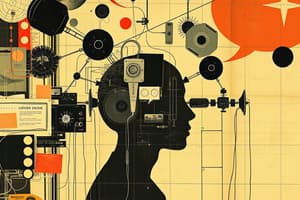Podcast
Questions and Answers
What does ICT primarily refer to?
What does ICT primarily refer to?
- The creation of online communities
- The use of computers in education
- Technologies that provide access to information and enable communication (correct)
- The development of artificial intelligence
What is an example of a network in ICT?
What is an example of a network in ICT?
- A mobile device
- A computer server
- The internet (correct)
- Microsoft Office
What is a benefit of ICT in education?
What is a benefit of ICT in education?
- Support for learning and teaching (correct)
- Improved communication with teachers
- Enhanced collaboration with students
- Reduced access to information
What is a challenge of ICT in terms of accessibility?
What is a challenge of ICT in terms of accessibility?
What is an example of how ICT is used in business?
What is an example of how ICT is used in business?
What is a potential negative impact of ICT on society?
What is a potential negative impact of ICT on society?
Flashcards are hidden until you start studying
Study Notes
What is ICT?
- ICT stands for Information and Communication Technology
- Refers to technologies that provide access to information and enable communication, such as computers, internet, and mobile devices
Components of ICT
- Hardware: physical components of ICT systems, such as computers, servers, and networking devices
- Software: programs and operating systems that run on hardware, such as Microsoft Office and Windows
- Networks: systems that enable communication and data transfer, such as internet and intranets
- Data: information stored and processed by ICT systems
Applications of ICT
- Education: ICT used to support learning and teaching, such as online courses and educational software
- Business: ICT used to improve productivity, communication, and collaboration, such as video conferencing and customer relationship management systems
- Healthcare: ICT used to improve patient care, such as electronic health records and telemedicine
- Government: ICT used to provide public services, such as online portals and digital identity systems
Benefits of ICT
- Improved efficiency and productivity
- Enhanced communication and collaboration
- Increased access to information and services
- New business opportunities and economic growth
Challenges of ICT
- Digital divide: unequal access to ICT due to factors such as income, location, and disability
- Cybersecurity threats: hacking, malware, and data breaches
- Dependence on technology: potential negative impact on social skills and relationships
- Environmental impact: e-waste and energy consumption
What is ICT?
- ICT stands for Information and Communication Technology
- Refers to technologies that provide access to information and enable communication, such as computers, internet, and mobile devices
Components of ICT
- Hardware: physical components of ICT systems, including computers, servers, and networking devices
- Software: programs and operating systems that run on hardware, such as Microsoft Office and Windows
- Networks: systems that enable communication and data transfer, including internet and intranets
- Data: information stored and processed by ICT systems
Applications of ICT
- Education: ICT supports learning and teaching through online courses, educational software, and other digital tools
- Business: ICT improves productivity, communication, and collaboration through video conferencing, customer relationship management systems, and other digital solutions
- Healthcare: ICT enhances patient care through electronic health records, telemedicine, and other digital health services
- Government: ICT provides public services through online portals, digital identity systems, and other digital platforms
Benefits of ICT
- Improves efficiency and productivity
- Enhances communication and collaboration
- Increases access to information and services
- Creates new business opportunities and drives economic growth
Challenges of ICT
- Digital divide: unequal access to ICT due to income, location, and disability disparities
- Cybersecurity threats: hacking, malware, and data breaches pose significant risks
- Dependence on technology: potential negative impact on social skills and relationships
- Environmental impact: e-waste and energy consumption contribute to environmental degradation
Studying That Suits You
Use AI to generate personalized quizzes and flashcards to suit your learning preferences.




